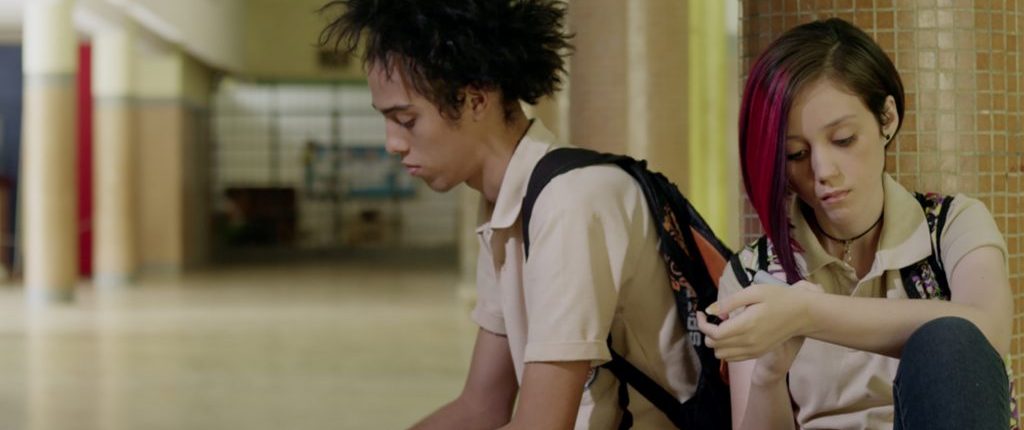At the heart of Carmen La Roche‘s Voy por Ti (Following You) is a knotted tangle of 21st century teenage angst. There’s sexting and cyber bullying. There’s slut-shaming and revenge porn. There’s failed romance and heartbreak. There are dangerous dares and uncomfortable truths. To pun on its title, the Caracas-set film follows Marcos (Gregory Maldonado), a teenage misfit whose unruly hair and love of insects sets him apart from the rowdy macho teen horndogs in his high school. He spends his days pining away for Maryuri (Genesis Vernaza), a beautiful and popular girl with a reputation as “easy” who’s likely to be found having sex in one of the graffitied bathrooms during the school day. Per high school-set films logic, there is also a young artistic girl (Andrea Levada) who, in turn is in love with Marcos, and Yorman (Santiago Osuna), a bully (who’s already a father before even graduating) who arranges Maryuri’s bathroom trysts in return for his affection.
If the descriptions alone don’t already alert you, the public school kids in Following You live in a world where adults are either absent or indifferent. La Roche’s film is intent on dissecting contemporary Venezuelan life through its current teenage generation. Left to their own devices, her characters run stolen phone-selling businesses, have sexual escapades, and engage in inappropriate online interactions unchecked. Marcos eventually finds himself an inadvertent co-conspirator in a prank that alienates him from his classmates, pushing him to betray those who trusted him with NSFW pictures only intended for him.
“We are living through a very tumultuous time,” she told the crowd at the Miami Film Festival during a post-screening Q&A. “We’re living through a dictatorship. But we’ve left our teenagers behind. We’re not paying attention to them. They’re kids who are not being given the healthy spaces they need to grow up. Schools have become a kind of microcosm of the nation. I was very interested in translating that to the screen: to see the state of Venezuela through the state our education system and see the country reflected in our teenagers.”
Her research for the film alerted her to ever more troubling insights on her country’s machismo and misogyny. The character of Maryuri, who all but sells herself to other boys to please the indifferent man she so loves, serves as a wake-up call to young girls everywhere who have been taught to uplift and admire men who are tough, unfeeling, and whose masculinity is defined by their cruelty.
It’s a double standard that attracted La Roche. “We live in a machista society, but it’s a matriarchy, actually. Women are the ones raising our boys. And they raise them as machos. There are women who like men when they have plenty of girls around. When a guy doesn’t have many conquests to his name, he’s not seen as a ‘real’ man. He’s not desirable.”
The story of Macos, Maryuri and Yorman is disturbing and eye-opening in equal measure. It’s like a gritty John Hughes film stripped of its cloying happy endings, exposing instead the cruel world that mean girls and boys-will-be-boys guys actually create for themselves. With a roughened edge that comes through in its shaky long takes and the washed out run-down Caracas it portrays, Following You is an alarming call to action as well as dispiriting portrait of a country in disarray.
Following You screened as part of the 2019 Miami Film Festival
